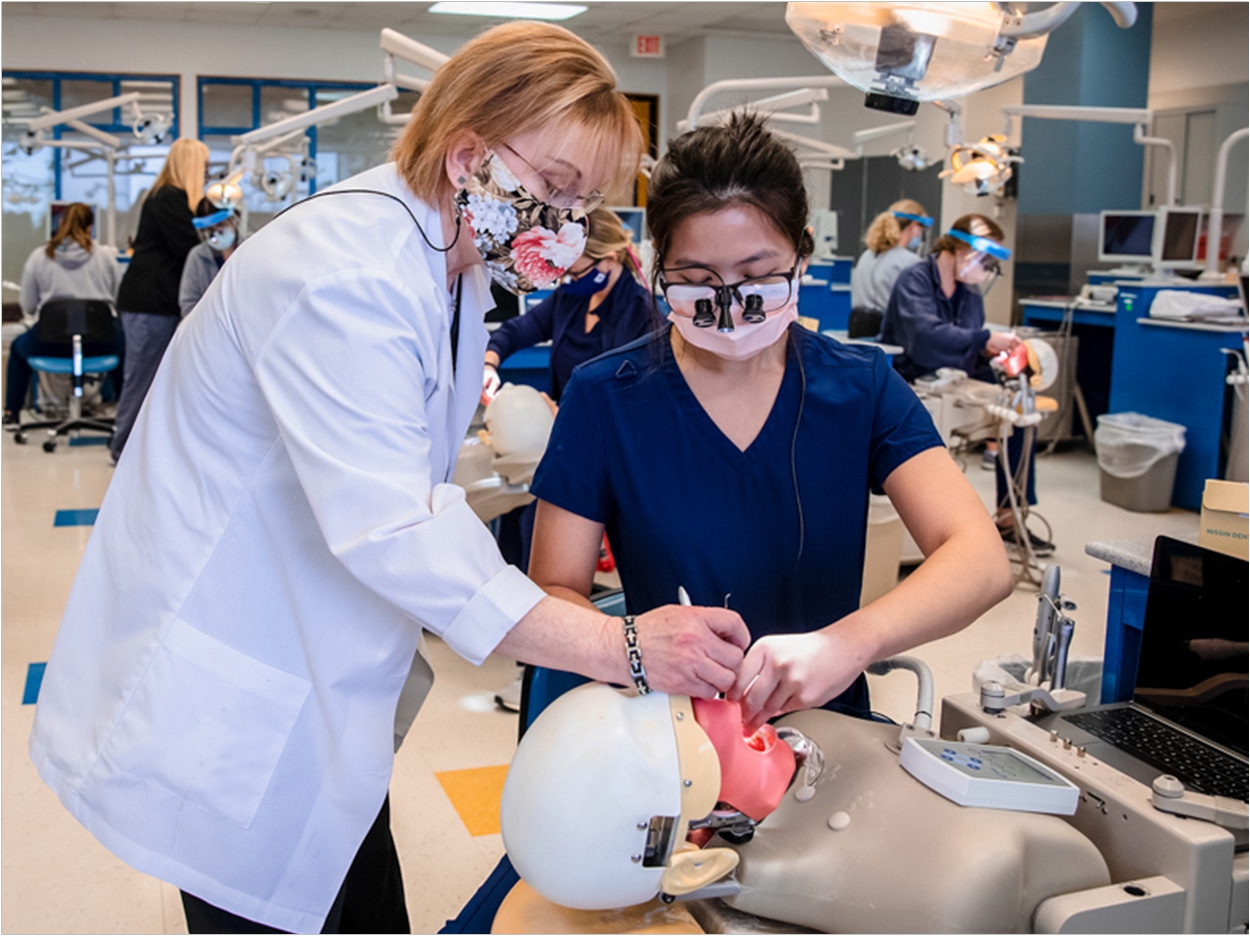
The American Dental Hygienists’ Association (ADHA) has named Dr. Sandra Horne, professor of dental hygiene at the University of Mississippi Medical Center (UMMC) School of Dentistry, its 2021 Educator of the Year.
“Typically on the first day of the class, I’ll ask my students, ‘When was the last time you had to develop a skill? What about riding a bicycle?’” Horne said as she reflected on how she teaches dental hygiene students how to safely and effectively clean a patient’s teeth.
“It took you many hours to perfect the technique. There’s no easy way to do it, except repetition,” Horne said.
Students in Horne’s Dental Hygiene Instrumentation class, for example, learn how to hold the tools they gently insert below a patient’s gumline. They also learn how their brain and fingers talk to each other about what they feel when they use those tools.
Horne’s lessons don’t depend on a textbook or on the notes that students take during a lecture, the school said. Instead, students work noiselessly in a laboratory on mannequin heads and mouths, focused on their “patient” and their tools to remove tartar below and above the gumline. Horne talks students through these hands-on lessons.
“You’re starting your one- to two-millimeter overlapping strokes,” she said during a recent class. “Tilt the tip slightly. Let it go under the gingiva. Stop, take a breath, roll it. Remember, you are coming across your patient’s chest and your arm is at a right angle.”
The school also noted that Horne is fond of her students.
“I want them to take pride in their work and not go for the easiest route,” she said. “Sometimes, what’s best is the most difficult path.”
This is the first time that a dental hygiene educator from the school has received the award.
“Every team has got to have a problem solver, and hands down, she is ours,” said Dr. Elizabeth Carr, associate professor and chair of the Department of Dental Hygiene. “To have her recognized at the national level for her ingenuity, and consistently looking at what is the best way to teach our students, she is coming into her own.”
Horne’s decisive action in the face of the COVID-19 pandemic is just one example of her resiliency and innovation, Carr said. When the virus kept students from attending class in person, “Sandra immediately went into problem-solving mode. She analyzes situations and comes up with ingenious solutions, and they work because of the time she puts into planning and thinking it out,” Carr said.
Horne supplied her students with detailed videos of the teeth-cleaning process and explanation of the treatment as it unfolded. She continues to use videos in class to supplement students’ hands-on work.
“It’s no secret to say that when the pandemic hit, as a dental hygiene student in the midst of a heavy hands-on learning curriculum, I was terrified for my next steps,” said second-year student Ashlynn Baney. “Dr. Horne eased every worry I had and more. While being virtual, she still provided each student with one on one learning experiences.”
Horne “pushes you to be your best self,” said first-year student Colby Smith. “You can tell when she teaches how much she loves it.”
Barbara Brent, an instructor in the dental hygiene program, graduated with Horne from the dental hygiene program.
“Sandra has been a mentor to me as an educator as well as a colleague while I worked on advancing my education,” said Brent.
Horne joined the faculty in 1997 as a clinical education specialist, advancing to serve as clinical coordinator and director before rising to professor in 2016. She received her BS from the school in 2002 and her doctorate in healthcare administration in 2015.
Also, Horne earned a master degree in health service administration from Mississippi College in 2004. She was honored with the Outstanding Clinical Health Sciences and Health Administration Award in 2016 and was chosen the school’s Teacher of the Year in 2007. She was named to UMMC’s Nelson Order in 2005 as well.
The constantly changing landscape of dental hygiene education and practice keeps Horne engaged, the school said.
“I absolutely love it,” Horne said. “I enjoy digging into the material before I teach it. It’s inevitable that if you keep with research and practice, there’s enough change that it stays interesting.”
Horne also taught Carr.
“She has a knack for tweaking her message for the person she’s speaking to,” Carr said. “I can’t count the times I’ve come to her and said, ‘I don’t know what to say to this student.’”
Horne wants her students to graduate not just knowing the tools of the trade. She wants them to know how to connect with their patients.
“I want them to have genuine concern for providing optimum care,” she said. “I want them to give it their all.”
Related Articles
Improved Oral Hygiene Fights Pneumonia Risks Among Cancer Surgery Patients
The World’s Best Dental Schools: 2021 Edition
Dental Hygienists Need to Keep Up With Changing Technology


